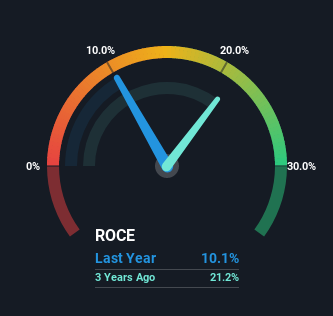Some Investors May Be Worried About Ganesha Ecosphere's (NSE:GANECOS) Returns On Capital

What trends should we look for it we want to identify stocks that can multiply in value over the long term? In a perfect world, we'd like to see a company investing more capital into its business and ideally the returns earned from that capital are also increasing. If you see this, it typically means it's a company with a great business model and plenty of profitable reinvestment opportunities. However, after briefly looking over the numbers, we don't think Ganesha Ecosphere (NSE:GANECOS) has the makings of a multi-bagger going forward, but let's have a look at why that may be.
Return On Capital Employed (ROCE): What is it?
For those who don't know, ROCE is a measure of a company's yearly pre-tax profit (its return), relative to the capital employed in the business. Analysts use this formula to calculate it for Ganesha Ecosphere:
Return on Capital Employed = Earnings Before Interest and Tax (EBIT) ÷ (Total Assets - Current Liabilities)
0.10 = ₹855m ÷ (₹11b - ₹2.4b) (Based on the trailing twelve months to March 2022).
Therefore, Ganesha Ecosphere has an ROCE of 10%. In isolation, that's a pretty standard return but against the Luxury industry average of 14%, it's not as good.
Check out our latest analysis for Ganesha Ecosphere

While the past is not representative of the future, it can be helpful to know how a company has performed historically, which is why we have this chart above. If you'd like to look at how Ganesha Ecosphere has performed in the past in other metrics, you can view this free graph of past earnings, revenue and cash flow.
So How Is Ganesha Ecosphere's ROCE Trending?
When we looked at the ROCE trend at Ganesha Ecosphere, we didn't gain much confidence. To be more specific, ROCE has fallen from 22% over the last five years. However, given capital employed and revenue have both increased it appears that the business is currently pursuing growth, at the consequence of short term returns. If these investments prove successful, this can bode very well for long term stock performance.
On a side note, Ganesha Ecosphere has done well to pay down its current liabilities to 22% of total assets. That could partly explain why the ROCE has dropped. Effectively this means their suppliers or short-term creditors are funding less of the business, which reduces some elements of risk. Some would claim this reduces the business' efficiency at generating ROCE since it is now funding more of the operations with its own money.
The Bottom Line
In summary, despite lower returns in the short term, we're encouraged to see that Ganesha Ecosphere is reinvesting for growth and has higher sales as a result. And the stock has done incredibly well with a 110% return over the last five years, so long term investors are no doubt ecstatic with that result. So should these growth trends continue, we'd be optimistic on the stock going forward.
One more thing to note, we've identified 2 warning signs with Ganesha Ecosphere and understanding these should be part of your investment process.
While Ganesha Ecosphere may not currently earn the highest returns, we've compiled a list of companies that currently earn more than 25% return on equity. Check out this free list here.
New: Manage All Your Stock Portfolios in One Place
We've created the ultimate portfolio companion for stock investors, and it's free.
• Connect an unlimited number of Portfolios and see your total in one currency
• Be alerted to new Warning Signs or Risks via email or mobile
• Track the Fair Value of your stocks
Have feedback on this article? Concerned about the content? Get in touch with us directly. Alternatively, email editorial-team (at) simplywallst.com.
This article by Simply Wall St is general in nature. We provide commentary based on historical data and analyst forecasts only using an unbiased methodology and our articles are not intended to be financial advice. It does not constitute a recommendation to buy or sell any stock, and does not take account of your objectives, or your financial situation. We aim to bring you long-term focused analysis driven by fundamental data. Note that our analysis may not factor in the latest price-sensitive company announcements or qualitative material. Simply Wall St has no position in any stocks mentioned.
About NSEI:GANECOS
Ganesha Ecosphere
Primarily manufactures and sells recycled polyester staple fiber in India and internationally.
Solid track record with reasonable growth potential and pays a dividend.
Market Insights
Community Narratives




